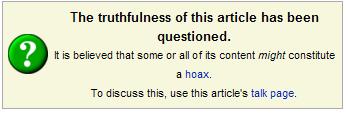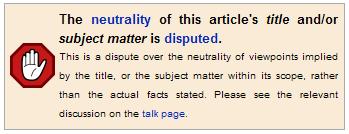Wikipedia’s credibility
Katherine Mangu-Ward has an interesting piece in Reason about the value of Wikipedia’s use of warning labels atop articles. “This little tag, I’m convinced, is the secret to Wikipedia’s success. And I’m not alone,” she writes.
I could just recommend the piece to you and leave it there. For example, she captures the Wikipedians’ self-aware sense of humor. (Wikipedia is comedy; Britannica is tragedy?) But I also want to clarify her use of something I said in my keynote. She didn’t get it wrong, the way The Crimson did, but it may leave a false impression. (Well, I thought I’d said that merely appearing in Wikipedia doesn’t make an article credible except in some probabilistic sense, but I was mumbling (audio here) and I’m not sure the phrase even makes sense.) So, just to be clear, here’s an article from the July 23 issue of my newsletter (it’s free!) on this very topic:
Simply appearing in the Encyclopedia Britannica confers authority on an article. Simply appearing in Wikipedia does not, because you might hit the 90 second stretch before some loon’s rewriting of history or science is found and fixed. Yet, Wikipedia is in some ways as reliable as the Britannica, and in some ways it is more reliable. Where does it get its authority?
There are a few reasons we’ll accept a Wikipedia article as credible. First, we apply the same rules of thumb as we do when listening to someone for the first time: Does she sound like she knows what she’s talking about? Does she seem fair? Does she seem to have some perspective? Does she blatantly contradict herself?
And, we are generally more likely to believe a major article than one on an obscure topic because it’s more likely to have been worked on by many people. Plus, we may already know something about the topic. If the article on the JFK assassination says he was poisoned by Rasputin, we’ll be disputin’ that article. The article gains credibility if we see it has a long edit history. It becomes yet more credible if the discussion pages are long and rich. (As someone pointed out to me a few months ago — who were you, dammit? — those pages are going to become remarkable artifacts as future historians try to understand our attitudes and beliefs. Imagine we had discussion pages for the 1950’s Wikipedia page on segregation.)
There’s one more sign of credibility of a Wikipedia page: If it contains a warning about the reliability of the page, we’ll trust it more. This is only superficially contradictory. Wikipedia has a page that lists the available notices. Here are some of the warnings available in the Disputes category.















The fact that Wikipedia encourages us to use these notices give us confidence that Wikipedia is putting our interests over its own.
So, why is it that you don’t see such frank notices in traditional sources such as newspapers and encyclopedias? Is it because their articles don’t ever suffer from any of these human weaknesses? Oh, sure, newspapers issue corrections after the fact, and “This is non-neutral opinion” is implicit on the Op-Ed page. But why isn’t there any finer grain framing of the reliability and nature of what’s presented to us in their pages? Can we come to any conclusion except that traditional authorities are more interested in maintaining authority than in helping us reach the truth? Which in the long run will be devastating to their credibility.
danah boyd has a terrific post on her problems getting the entry about her at Wikipedia corrected, pointing out the extent to which Wikipedia relies on the media. As other Wikipedians have pointed out, the person danah was dealing with there does not speak for all Wikipedians. In fact, no one speaks for all Wikipedians. But do check the discussion page at Wikipedia. [Tags: wikipedia katherine_mangu_ward knowledge everything_is_miscellaneous]
Categories: Uncategorized dw









